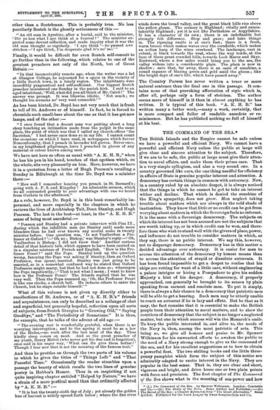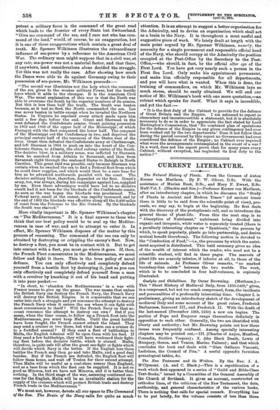THE COMMAND OF THE SEA.*
THE British Islands and the Empire cannot be safe unless we have a powerful and efficient Navy. We cannot have a powerful and efficient Navy unless the public at large will give close and sincere attention to the subject. Therefore, if we are to be safe, the public at large must give their atten- tion to naval affairs, and make them their prime care. That is a very simple syllogism, and also a very sound one. In a country governed like ours, the one thing needful for efficiency in affairs of State is genuine popular interest and attention. A democracy has certain things in common with autocracy. Now, in a country ruled by an absolute despot, it is always noticed that the things in which he cannot be got to take an interest wither and decline. That which is denied the sunshine of the King's sympathy, does not grow. Men neglect taking trouble about matters which are always in the cold shade of inattention. They know that little or no credit can be got from worrying about matters in which the Sovereign feels no interest. It is the same with a Sovereign democracy. The subjects on which its interest has not been aroused are not the subjects that are worth taking up, or in which credit can be won, and there- fore those who wish to stand well with the givers of place, power, and influence do not trouble to consider matters in which, as they say, there is no public interest. We say this, however, not to disparage democracy. Democracy has in this matter a decided advantage over autocracy. It is easier for men to arouse the attention of the democracy by honest means than to arouse the attention of stupid or dissolute autocrats. It has been found impossible to get a despot to realise that his ships are rotting for want of a little care, without engineering a palace intrigue or hiring a Pompadour to give his sodden Majesty a hint of his danger. A democracy, if properly approached, can generally be brought to its senses by plain speaking from earnest and resolute men. To put it simply, there is always a fair chance in a democracy that patriotic men will be able to get a hearing. Such men may be utterly unable to reach an autocrat if he is lazy and effete. But be that as it may, the fact remains that it is essential to make the British people turn their attention to naval matters, and to show the courtiers of democracy that the subject is no longer a neglected matter, but one in which success will win the Monarch's smile. To keep the public interested in, and alive to, the needs of the Navy is, then, among the most patriotic of acts. This being so, we give all honour and praise to Mr. Spenser Wilkinson for his unwearied efforts to awaken the public to the need of a Navy strong enough to give as the command of the sea, and for his excellent suggestions as to how to obtain a powerful fleet. The two shilling books and the little three- penny pamphlet which form the subject of this notice are admirably adapted to excite interest in the Navy. They are popular in the best sense. That is, they are clear and short, vigorous and bright, and drive home one or two plain points with force and precision. The first chapter of The Command of the Bea shows what is the meaning of sea-power and how • (1.) The Command of the Sea. ay Spenser Wilkinson. London: Constable and Co.—(2.) The Brain of the Nary. Same Author and Poblieber.—(3.) The Secret of the Sea : a Chapter Extracted front "The Great Alternative." Same 4rithor. Published for the fsavy Leasul by Swim Sonpenseitela and Co,
potent a military force is the command of the great road which leads to the frontier of every State but Switzerland. "Give me command of the sea, and I care not who has com- mand of the land," would, of course, be an exaggeration, but it is one of those exaggerations which contain a great deal of truth. Mr. Spenser Wilkinson illustrates the extraordinary influence of sea-power by a reference to the American Civil War. The ordinary man might suppose that in a civil war, at
any rate, sea-power was not a material factor, and that there, if anywhere, land considerations alone decided the struggle. Yet this was not really the case. After showing how much the Danes were able to do against Germany owing to their possession of sea-power, Mr. Wilkinson proceeds :—
"The second war illustrates not the help which the command of the sea gives to the weaker military Power, but the terrific force which it adds to the stronger. It is the American Civil War. The usual explanation of this war is that the North was able to overcome the South by the superior numbers of its armies. But this is less than half the truth. The South was beaten because, as it had no fleet, the North commanded the sea. Lee was never beaten in battle except when he invaded the Northern States. In Virginia he repulsed every attack made upon him until a few days before the end. Grant and Sherman in the west defeated the Confederate armies, Grant gaining possession in 1862 and 1863 of the upper half of the Mississippi, of which Farrag,ut with the fleet conquered the lower half. The conquest of the Mississippi cut the Confederacy in two, and deprived the principal eastern half of the resources of the States west of the river. Grant, then defeated the Confederate army at Chattanooga, and left Sherman in 1864 to push on into the heart of the Con- federate States, to Atlanta, the chief railway centre of the South. The decisive blow, in a military sense, was inflicted by Sherman when he marched from Atlanta to Savannah, and then from Savannah right through the seaboard States to Raleigh in North Carolina. This great raid was possible only because Sherman was certain when he reached the sea to find a Federal fleet from which he could draw supplies, and which would then be a sure base for him as he advanced northwards parallel with the coast. The decisive military blow, therefore, depended on the fleet. Grant's army, too, was always, during his campaigns against Lee, supplied by sea. Even these advantages would have led to no decisive result had it not been for the blockade of the Confederate coasts. As soon as the war began the blockade was proclaimed. The Federal navy, small at the outset, was rapidly increased, and by the end of 1862 the blockade was effective along all the 2,400 miles of coast from the Potomac to the Rio Grande. By the blockade the South was starved."
More vitally important is Mr. Spenser Wilkinson's chapter on "The Mediterranean." It is a final answer to those who think that our beat policy would be to seal up the Mediter- ranean in case of war, and not to attempt to enter it. In effect, Mr. Spenser Wilkinson disposes of the matter by this process of reasoning. The command of the sea can only be obtained by destroying or crippling the enemy's fleet. Now, to destroy a fleet, you must be in contact with it. But to get into contact with a fleet, you must go where it goes. If, then, the French Fleet concentrates in the Mediterranean, we must follow and fight it there. This is the true policy of naval defence. You can only effectively and completely defend yourself from a hostile fleet by destroying it, just as you can only effectively and completely defend yourself from a man with a revolver by knocking it out of his hand and putting it into your pocket:—
"In short, to 'abandon the Mediterranean' in a war with France means to give rip the game. The war means that unless the British Navy can destroy the French Navy, the French Navy will destroy the British Empire. Is it conceivable that we can enter into such a struggle and yet renounce the attempt to destroy the French Navy when it enters the sea where it can fight with most convenience to itself ? Will the French Navy on that ac- count renounce the attempt to destroy our own ? But if you mean, when the time comes, to follow up a French fleet into the Mediterranean, you must keep Malta. Until the great battles have been fought, the French cannot attack the island. They may send a cruiser or two there, but what harm can a cruiser do to a fortified arsenal ? If they send a fleet of battleships to Malta, the English Admiral will be upon them with his fleet. If they send a few battleships, they will have weakened their fight- ing fleet before the decisive battle, which is absurd. Malta, therefore, is quite safe till after the great sea-fight or fights which will decide which Navy is the better. If the English lose these battles the French may then go and take Malta, and a good deal besides. But if the French are defeated, the English fleet will follow them home, and wait off Toulon for their second attempt. Then Malta will be useful as a coal-store nearer than England, and as a base from which the fleet can be supplied. It is not so good as Minorca, but we have not Minorca, and it is better than nothing. In the third stage of the war, assuming continued suc- cess for the English, Malta will be an invaluable station for the supply of the cruisers which will protect British trade and destroy French trade in the Mediterranean" We must not, however, devote all our space to The Command of the Sea. The Brain of the Navy calls for quite as much
attention. Itis an attempt to suggest a better organisation for the Admiralty, and to devise an organisation which shall act as a brain to the Navy. It is throughout a most useful and suggestive piece of work. We lately dealt at length with the main point argued by Mr. Spenser Wilkinson, namely, the necessity for a single permanent and responsible official head of the Navy, who should occupy at the Admiralty the position
occupied at the Post-Office by the Secretary to the Post- Office,—who should, in fact, be the official alter ego of the First Lord. You have got very nearly such a person in the First Sea Lord. Only make his appointment permanent, and make him officially responsible for all departments, and you will have what is wanted. When this is done, the training of commanders, on which Mr. Wilkinson lays so much stress, should be easily obtained. We will end our notice of Mr. Wilkinson's book with one more quotation,—an
extract which speaks for itself. What it says is incredible, and yet the fact :—
"It is the first duty of the Cabinet to provide for the defence of Great Britain and the Empire. I am ashamed to repeat so elementary and incontrovertible a statement, but it is absolutely necessary to do so in order to appreciate the fact stated by Lord Hartington's Commission, that No combined plan of operations for the defence of the Empire in any given contingency had ever been worked out by the two departments.' Does it not follow that during the period covered by this report no Government had ever considered the defence of the Empire ; no Cabinet ever inquired what were the arrangements contemplated in the event of a war ? In a word, does not the report prove that for many years every Cabinet, without exception, has neglected its first duty to the nation ? "



















































 Previous page
Previous page